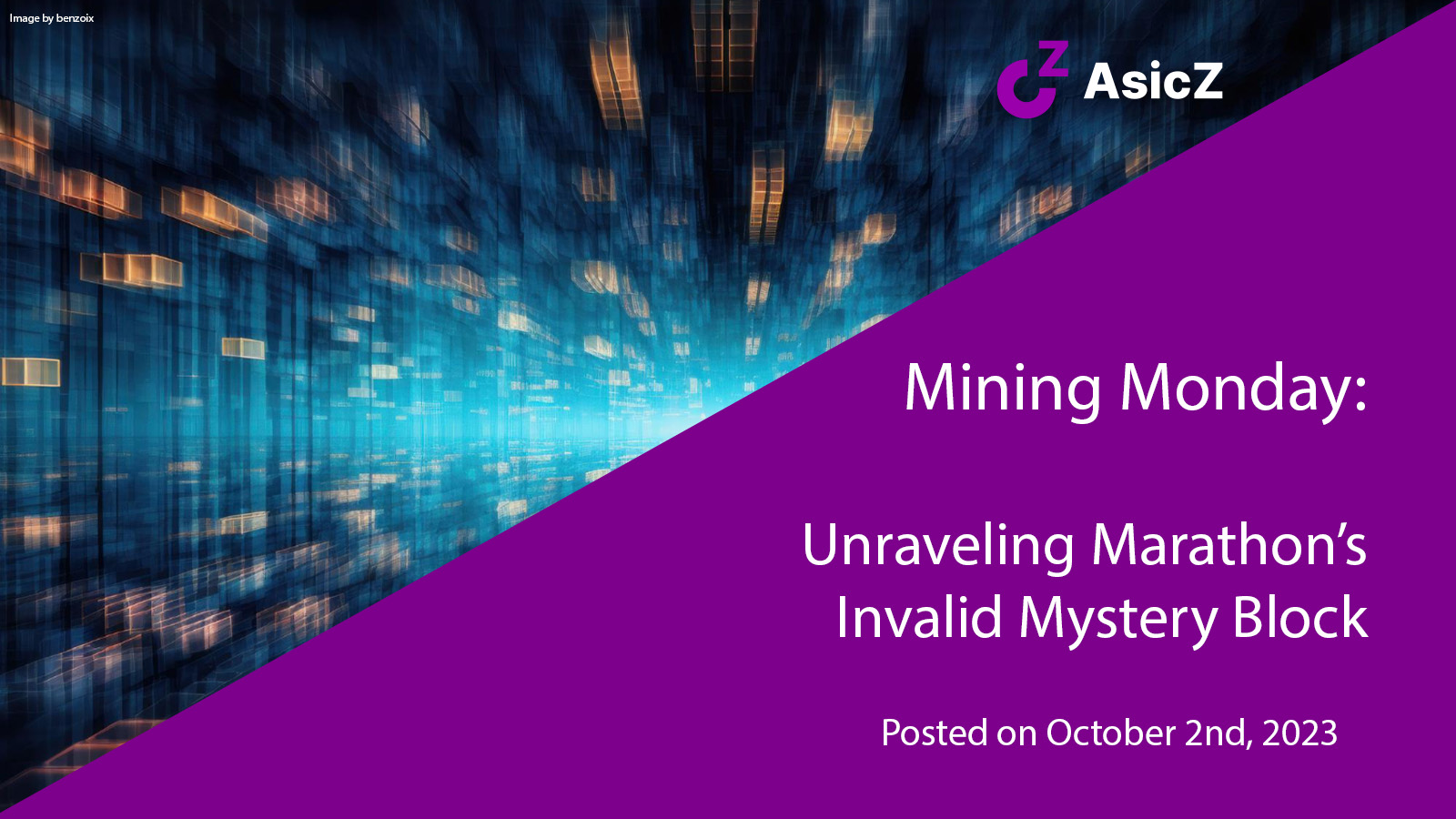Welcome to another enlightening edition of Mining Monday. In this week’s installment, we meticulously unpack the recent incident involving Marathon Digital Holdings and the mining of an invalid Bitcoin block. This occurrence has the mining community buzzing, highlighting the critical importance of transaction ordering and adherence to consensus rules. As we dig deeper into the incident, its historical context, and implications, we aim to provide a comprehensive and detailed insight, ensuring that industry experts and enthusiasts alike are well-informed and equipped with the knowledge to navigate the complexities of Bitcoin mining.
The Incident
On September 26, 2023, Marathon Digital Holdings, a renowned mining firm, inadvertently mined an invalid block on the Bitcoin network. This was a result of an internal experiment aimed at enhancing its operations. The error was attributed to a transaction ordering issue, where transactions within the block were inadvertently resorted in order of ascending absolute fees, leading to a situation where one transaction attempted to spend an input from another transaction that was included later in the block. This error rendered the block invalid as per the consensus rules of the Bitcoin network, which mandate a specific transaction order to ensure the validity and security of the block and the network.
Historical Context
This incident is not an isolated event in the mining industry. Past instances have seen notable companies like Bitmain losing approximately $150,000 due to an invalid Bitcoin block in June 2019. The block was rejected by the network after being mined, resulting in the cancellation of the 12.5 BTC reward, equivalent to $146,200 at the time. Another incident in April 2023 saw F2Pool producing an invalid block at height 783426. These incidents highlight the critical importance of adhering to the consensus rules and ensuring the validity of blocks before they are added to the blockchain.
Technical Details
In the case of Marathon Digital Holdings, the invalid block was mined during an experiment within the firm’s internal development environment. This environment was separate from Marathon’s main Bitcoin production pool, ensuring that the incident did not impact the broader Bitcoin network or Marathon’s primary mining operations. Despite this separation, the incident underscores the importance of rigorous testing and validation in development environments to prevent similar issues in live production environments.
The error in transaction ordering in the invalid block stemmed from a misconfiguration in the experimental setup. Transactions within a block must adhere to a specific order to ensure the integrity and security of the block and the network. Any deviation from this order, as seen in this incident, leads to the block being deemed invalid by the network, preventing its addition to the blockchain and resulting in the loss of the block reward and the resources allocated for mining the block.
Implications for Bitcoin Mining
The mining of an invalid block by Marathon Digital Holdings highlights several key implications for Bitcoin mining:
- Robustness of the Network: The incident underscores the robustness of the Bitcoin network in identifying and rejecting invalid blocks, ensuring the integrity and security of the blockchain. This robustness is a critical feature of blockchain networks, providing assurance and stability for network participants.
- Importance of Transaction Ordering: The incident emphasizes the critical importance of ensuring the correct order of transactions within a block. Adhering to the consensus rules for transaction ordering is paramount for the validity of blocks and the security of the network.
- Financial and Reputational Risks: Mining invalid blocks results in financial losses due to the loss of the block reward and the resources allocated for mining the block. Additionally, it poses reputational risks for mining firms, highlighting potential vulnerabilities and oversights in their operations.
- Need for Rigorous Testing: The incident highlights the need for rigorous testing and validation in development environments to prevent similar issues in live production environments. Ensuring the correctness and validity of blocks before they are mined is essential to avoid the mining of invalid blocks.
As we conclude this edition of Mining Monday, the incident involving Marathon Digital Holdings underscores the critical importance of vigilance, adherence to consensus rules, and the robustness of the Bitcoin network in maintaining the integrity and security of digital asset mining. For those dedicated to staying ahead in the industry, AsicZ is your paramount resource. Our blog is a rich repository of daily articles offering deep insights into the evolving world of digital assets, blockchain technology, and mining.
If you’re a seasoned professional or embarking on your mining journey, AsicZ.com is your comprehensive hub. Discover our extensive range of mining hardware and invaluable tools, including our hosting and profitability calculators, ensuring your mining operations are optimized and profitable. We are also proud to offer MaaS (Mining as a Service) with power rates lower than .03/kWh, ensuring sustainable and efficient mining operations. As we stand at the intersection of innovation and technology in Bitcoin mining, AsicZ is committed to providing the resources, tools, and insights to ensure your mining activities are seamless, profitable, and secure.
References
- “Bitcoin Mining Firm Marathon Mines Invalid Block, BTC” – Cointelegraph
- “Bitcoin Miner Marathon Reportedly Mines Invalid BTC Block” – Coindesk
- “Invalid Block Found in Bitcoin Blockchain: Here’s What Happened” – U.Today
- “Marathon Mined an Invalid Bitcoin Block—Here’s What That Means” – Decrypt

